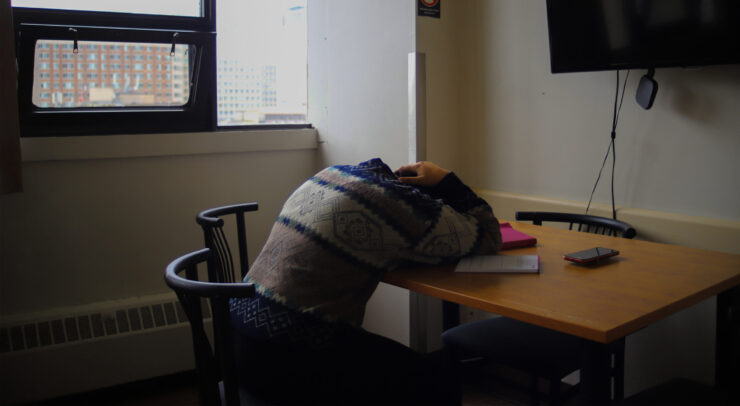Band Nothing More has gained a large following for supporting mental health
Grammy-nominated rock band Nothing More played at the Canadian Tire Centre on Oct. 18, opening for the Grammy-winning metal band Ghost. Nothing More is beloved by their fans largely because of their lyrics, which openly and bluntly draw from dark experiences in the band members’ lives, but present these stories with hopeful messages of self-improvement and perseverance.
One song in particular, “Jenny,” about frontman Jonny Hawkins’ sister’s struggles with drug addiction and bipolar disorder, was praised for helping to open up the discussion about mental illness within the rock community.
Since releasing that song, Nothing More has promoted the Jed Foundation, Bring Change To Mind and To Write Love On Her Arms during various tours. The Fulcrum had the opportunity to sit down with the band’s guitarist Mark Vollelunga before the concert to discuss these topics and what University of Ottawa students can learn from his experiences.
The following interview has been edited for clarity and length.
The Fulcrum: What kind of advice do you have for people in university who are going through life issues or will soon be facing life issues, going out into the world for the first time?
Mark Vollelunga: Just speaking from my personal past the most helpful thing I think any kid and college student can have are the friends around you. If you don’t have good friends, change your friends. Beyond that, these days there are organizations that you can call and helplines that you can look up on the internet, as well as therapists. Honestly, I don’t know why it was ever a taboo in the first place to admit “Oh, I have problems” or “Why do I feel that weird or shaky or anxiety when this happens?” I think the most important thing is to realize that, hey, we’re all messed up, but we’re all in this together and that there are answers and people that do care around you.
F: What kind of responses have you gotten from people who have been impacted by Nothing More’s music and charity work?
MV: In regards to charity, we did the Truth tour (to promote their most recent album), and we’re partnering with To Write Love On Her Arms, spreading hope and that you’re not alone and we’re in this together. We donated $1 from every ticket sale, so I think we raised near $50,000 or $70,000, which is excellent. In the past with the #IKnowJenny campaign, I think over the whole year through all our VIP offerings we raised close to $100,000 for To Write Love On Her Arms, the Jed Foundation, Bring Change To Mind, and a few others. This has been great because music has helped me early on in my life and through some of my own personal anxiety struggles. Certain bands and certain songs would really connect with me and actually that would be my only form of defence. So I’m always honoured to hear personal stories from fans and friends about how much a certain song or album means to them.
F: Did you intend, when you were writing the albums, for so many positive messages on mental health to show up?
MV: I don’t necessarily think so. It’s not like we set out to write a song and think we’re going to partner with this organization and we’re going to bring so much change to the world and help. It starts from within, and it starts with a personal story. And we love songs like “Eleanor Rigby” and artists like Ben Folds that share these really personal stories where you want to know who that character is. Who are they talking about? With “Jenny,” it’s like telling a story and actually making it personal to where these are our experiences. It’s not just some made-up story that’s been fictionalized. I think it started from a place of this is what I’m going through and let’s write about it. Let’s get it out there for your own personal benefit as well as to tell a good story and be real and raw with the lyrics and the music. And hopefully it connects and if it brings some change, if we can help people, that’s awesome.
F: With “Jenny,” I know that song has gained a lot of traction in the mental health community (Psychology Today covered it). Did you expect that song to actually gain as much traction as it did?
MV: Definitely not. Again, it just started from a personal story about Johnny’s pain and we felt that a lot of people could relate to a personal family member having a mental illness in a way that doesn’t write off everything that you do, but it helps people understand and explain their behaviour. People shouldn’t be shunned for having mental illness and at the same time, the song does touch on a tough-love sort of scenario.
F: Regarding the writing process, how do your thoughts translate into guitar composition?
MV: Getting music geeky, my creative process is like, ‘I haven’t written a song in this key before,’ or ‘I should try playing in this key on this fret’ type of thing. I know that I’ve seen creativity result from when I put myself in a box. There’s the phrase ‘limitation breeds creativity.’ Putting yourself outside of your comfort zone, you can’t rely on the regular tricks that you’re normally used to doing. In the meantime, I’m trying to build my own repertoire. I’m writing some songs on ukulele and on an eight-string right now and just trying to keep the creativity going.
F: Do you have a favourite song to perform?
The answer always changes. I think right now I really like playing “Fade in Fade Out.” It’s a pleasure to play. And we just had been playing Christ Copyright a bunch. I found myself really liking that song again and feeling the power of the guitar and that song. It’s a lot of fun.
F: How do you think rock reaches people on these sensitive topics compared to other genres?
A good song is a good song, regardless of genre. The lyrics connect, the mood is there, you can hear the passion in the vocals and the way everything’s delivered. So I wouldn’t say that one genre is stronger than another. It just depends, I guess.
F: What do you want the audience to take away from your music?
MV: I think we want people to feel whatever the emotion is that’s delivered. Have it be a raw, truthful moment. We want to tug on people’s heartstrings if you’re watching us live or if you’re just listening to a song. We want to make them think as far as your own personal truth and to just make you question why you believe what you believe in regards to politics, religion, spirituality, life, etc. And I think the role as an artist, Dan (Oliver, Nothing More’s bassist) said this once before, is to absorb all of the beauty and destruction in the world and kind of spit it back out.
F: You and the other members of Nothing More were all going through personally difficult times during the creation of both of the last two albums. Do you feel like you’re in a better position now compared to before?
MV: Yeah, I’d say so. I feel like things have been getting better. As far as what’s going on personally in all of our lives, we all have our own struggles and we’re all in different situations. I think the next album we create will be a different record in regards to us being geographically removed from each other. I think that will be good for some reasons and then bad for other reasons, but the good thing to know is that we don’t release anything that’s not done and has not been given our stamp of approval in regards to criteria such as ‘Does this give me chills? Is this something that we can all stand behind in good conscience and really believe it?’
F: Is it actually possible for your own music to give you chills, even after being kind of desensitized to it, having heard it so many times?
MV: Absolutely. Maybe you can become desensitized, but that’s why you have other people and you keep each other in check. It’s like, while Jonny’s working on this idea and kind of getting burnt out, he’ll show us. And then I’ll be like, ‘Oh, this is great. All you need to do is change this, change that, just a little tweak here… And he’ll do the same thing with me on guitar and, and Dan will help polish lyrics. We just all work together and it helps to have people you trust and have those fresh ears that aren’t attached and aren’t super desensitized.





